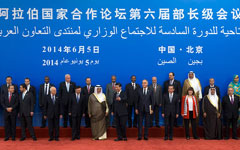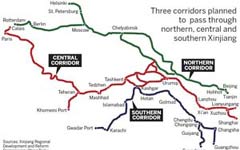DUSHANBE -- China and Turkmenistan on Friday vowed to deepen energy cooperation and jointly build the Silk Road Economic Belt.
 |
 |
Xi said the China-Turkmenistan strategic partnership realized a good start and the two countries have become a community of shared interests and common destiny. He urged the two sides to continue to deepen the energy cooperation.
The Chinese president called on the two countries to ensure the construction and operation of the China-Central Asia gas pipeline as well as the construction of the second phase of the Fuxing Gas Field.
The two countries should optimize trade structure, expand cooperation in such fields as electricity, manufacturing industry and agriculture, jointly push forward the building of the Silk Road Economic Belt and promote cooperation in transportation and telecommunication, Xi said.
The two countries should jointly fight against "the three evil forces" of terrorism, separatism and extremism, said Xi, adding that China is willing to help Turkmenistan to popularize the Chinese language and promote people-to-people exchanges.
Berdymukhamedov said Turkmenistan will enhance mutual political support with China and boost practical cooperation.
He thanked China for respecting the permanent neutrality policy adopted by Turkmenistan, adding that his country will continue to support China firmly on the issues concerning China's core interests and major concerns.
The president said Turkmenistan will realize the goal of transferring gas to China as scheduled by participating in the construction of Central Asia-China gas pipeline and the second phase of the Fuxing Gas Field.
Turkmenistan is willing to participate in the building of the Silk Road Economic Belt, improve its own transportation infrastructure and promote transborder transportation between Central Asian countries and China, Berdymukhamedov said.
The Sept. 11-12 summit brought together Xi and his counterparts from other members of the SCO.
Founded in 2001, the SCO groups China, Kazakhstan, Kyrgyzstan, Russia, Tajikistan and Uzbekistan. It has Afghanistan, India, Iran, Mongolia and Pakistan as observers, and Belarus, Sri Lanka and Turkey as dialogue partners.
